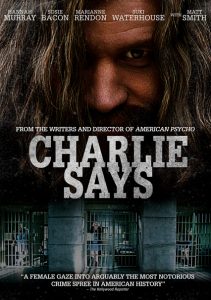Charlie Says-2019
Director-Mary Harron
Starring-Hannah Murray, Sosie Bacon
Scott’s Review #936
Reviewed August 28, 2019
Grade: B
With the very high-profile release of Quentin Tarantino’s Once Upon a Time in Hollywood (2019) centering around the sadistic Manson murders of 1969, Charlie Says (2019) is another film that delves into the same story though in a very different way.
The latter takes the perspective of the followers, victimizing them, and the choices they made that affected the rest of their lives. The angle is of interest, but the production never completely takes off, resulting in an uneven experience with the need for more grit and substance.
Karlene (Merritt Wever), a female graduate student focused on women’s studies, takes an interest in three followers who viciously killed in the name of their “god”, Charles Manson.
A few years after their arrests, they co-exist together in relative solitary confinement in a California penitentiary. They remain under the delusion that Manson is their leader and their deeds were all part of a grand cosmic plan until Karlene slowly brings them out of their haze of unreality with heartbreaking results.
The casting of the real-life figures is as follows: Charles Manson (Matt Smith), Leslie Van Houton (Hannah Murray), Patricia Krenwinkel (Sosie Bacon), and Susan Atkins (Marianne Rendon).
Each is a prominent character with the central figure being Leslie “Lulu” and her complex relationship with Manson.
The newest to be recruited, the audience witnesses her hypnotic possession and her occasional uncertainty about the cult. For a fleeting moment, she is even tempted to leave, which the film hammers home to the audience.
Murray plays the character well but does not resemble her enough for praise, though we read the conflict on her face very well. She is meant to be the thoughtful member of the Manson Family whereas Patricia and Susan are more reactionary and temperamental, especially Susan.
Whether this is how things were is not known but I always had a gnawing feeling throughout the running time that historical accuracy may have been secondary to the story points and dramatic effect.
Charlie Says is bothersome because of the realization that the girls were recruited and fed lies, falling for the deceit, hook, line, and sinker.
The followers were certainly brainwashed into Manson’s disturbing version of reality and that fact is disturbing as the girls were not dumb people, only vulnerable young women.
Decades later, it is easy to think of other victims polarized by a central or controversial figure whether it be in politics or another arena. The lesson learned is that people can be easily influenced.
The actual “murder night” and the death of Sharon Tate are featured but up close and personal gore is thankfully avoided. The actress, well known to have suffered a terrible fate, to say nothing of her unborn baby, are a small but crucial aspect of the film.
When one of the girls watches one of Tate’s films in her cell, another girl clamors for her to turn off the film, beginning to feel pangs of guilt and remorse.
The film questions the girl’s responsibilities for their actions, a fact that in real-life many wrestled with, including the courts and parole boards. Were they merely duped in the cleverest of ways or do they deserve their fates?
Spared of the electric chair due to a California law, a positive of the film is a current update of the happenings of each girl, now over forty years later, mature women. Lulu and Patricia remain incarcerated while Susan has died in prison.
After the film closes and a good measure of time is left to ponder the film, I was left feeling slightly less than fulfilled and desiring a bit more.
Charlie Says (2019) feels safe and lacks enough grit or bombast, although it does feel well-intended. The film is clearly from the feminist point of view and is an interesting watch though, given the subject matter, I hoped for more meat and substance.
